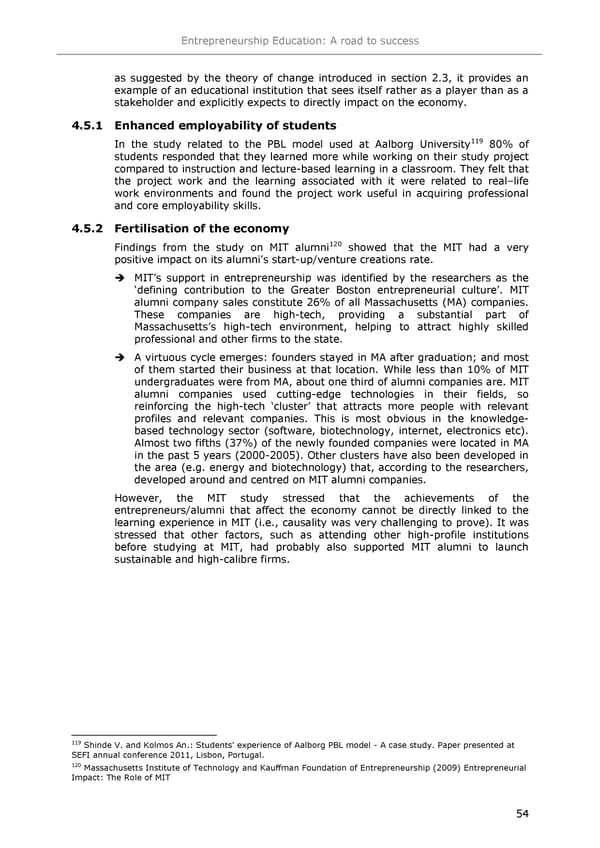Entrepreneurship Education: A road to success as suggested by the theory of change introduced in section 2.3, it provides an example of an educational institution that sees itself rather as a player than as a stakeholder and explicitly expects to directly impact on the economy. 4.5.1 Enhanced employability of students 119 In the study related to the PBL model used at Aalborg University 80% of students responded that they learned more while working on their study project compared to instruction and lecture-based learning in a classroom. They felt that the project work and the learning associated with it were related to real3life work environments and found the project work useful in acquiring professional and core employability skills. 4.5.2 Fertilisation of the economy 120 Findings from the study on MIT alumni showed that the MIT had a very positive impact on its alumni9s start-up/venture creations rate. MIT9s support in entrepreneurship was identified by the researchers as the 8defining contribution to the Greater Boston entrepreneurial culture9. MIT alumni company sales constitute 26% of all Massachusetts (MA) companies. These companies are high-tech, providing a substantial part of Massachusetts9s high-tech environment, helping to attract highly skilled professional and other firms to the state. A virtuous cycle emerges: founders stayed in MA after graduation; and most of them started their business at that location. While less than 10% of MIT undergraduates were from MA, about one third of alumni companies are. MIT alumni companies used cutting-edge technologies in their fields, so reinforcing the high-tech 8cluster9 that attracts more people with relevant profiles and relevant companies. This is most obvious in the knowledge- based technology sector (software, biotechnology, internet, electronics etc). Almost two fifths (37%) of the newly founded companies were located in MA in the past 5 years (2000-2005). Other clusters have also been developed in the area (e.g. energy and biotechnology) that, according to the researchers, developed around and centred on MIT alumni companies. However, the MIT study stressed that the achievements of the entrepreneurs/alumni that affect the economy cannot be directly linked to the learning experience in MIT (i.e., causality was very challenging to prove). It was stressed that other factors, such as attending other high-profile institutions before studying at MIT, had probably also supported MIT alumni to launch sustainable and high-calibre firms. 119 Shinde V. and Kolmos An.: Students' experience of Aalborg PBL model - A case study. Paper presented at SEFI annual conference 2011, Lisbon, Portugal. 120 Massachusetts Institute of Technology and Kauffman Foundation of Entrepreneurship (2009) Entrepreneurial Impact: The Role of MIT 54
 Entrepreneurship Education Page 57 Page 59
Entrepreneurship Education Page 57 Page 59